
A Critical Edition of Caroline Norton's Love in 'The World
(Hardback)
Publishing Details
A Critical Edition of Caroline Norton's Love in 'The World
By (Author) Ross Nelson
Edited by Marie Mulvey-Roberts
1
Anthem Press
Anthem Press
10th October 2023
United Kingdom
Classifications
Professional and Scholarly
Fiction
Historical romance
Historical fiction
823.8
Physical Properties
Hardback
198
Width 153mm, Height 229mm, Spine 26mm
454g
Description
The extant novel begins with Alixes cousin Charles, with whom she was raised and who has recently returned from sea, declaring his love for Alixe. She, however, views Charles as a brother and is already romantically committed to a high-living Regency dandy and politician, Everard Price, whom she had met and fallen in love with during her first London season. Tensions rise after Charles accidentally damages an item of jewellery given to Alixe by Everards sister Emily. As Alixe leaves the St Clairs country estate with her aunt for a second season, the omniscient author introduces the back story that will explain in detail her heroines first season.
A year previously Alixe and Lady St Clair had visited London to stay with the latters aunt, who introduced them both to London society. This encompassed the pretty but contrasting sisters, Annette and Pamela Aimwell, and the more mature Emily Price (possibly based on Norton herself). Alixe is transfixed by both Emily and her brother Everard, who makes a play for his sisters new friend, throwing over Annette Aimwell and, when Emily paints Alixes portrait, ensures that she is portrayed wearing a wedding ring. After the death of their mother, the Prices decide to recuperate with friends at Geneva. It is at this point, between seasons, that Charles St Clair re-enters the narrative, which has by this time caught up with the novels opening scenes. As the next season opens, news filters through that the Aimwells brother has killed the villainous Lord Darlies due to his failure to honour a marital obligation to Pamela, in a duel. We learn that Darlies was also largely responsible, out of jealousy, for the early death of an admirer of Emily Price, who since this loss has remained determinedly single.
Emily and her brother arrive in London with the charismatic Honorine de Falcone and her husband, their hosts at Geneva. Alixe is frustrated by Everards obvious fascination with Honorine but impressed by his debut speech in the House of Commons (observed from the ladies Ventilation room situated over the chamber), to which he had been elected the previous year. She continues to maintain a distance between herself and Charles (whom she still loves strictly as a sister) and becomes friends with Honorine, despite Everards increasing preference for the older woman. He is involved in a serious accident due to his inability even to visit Alixe without first driving past Honorines house. Harry Dunstanes reputation is entirely destroyed (he had already been dismissed as an MP for bribing voters) when he is discovered to have ordered the poisoning of a racehorse, the favourite in a forthcoming race, having bet on the horses rival. Subsequently, he attempts to murder another racegoer, who had discovered his crime and shoots Everard in the arm while seeking to elude capture. During his recovery he continues his relationship with Honorine and at the end of the novel, with Emilys encouragement, Alixe confronts the him and releases him from his voluntary engagement to her. Afterwards, Emily assures her friend that she has done the right thing and explains that as a woman of the world (reflecting the novels title) bewitched by false glare and excitement of an all-engrossing vanity, Honorine would never voluntarily relinquish Everard (or abandon her husband). The reader is left wondering whether Alixe should have followed Emilys advice and what might subsequently befall them both.
Author Bio
Ross Nelson is a cultural historian and author of several publications, including The Selected Letters of Caroline Norton, 3 vols (2019), co-edited with Marie Mulvey-Roberts, and Letters to Martin Van Buren: An Edition of John Van Burens Travel journal for a Trip to Europe, 1838-1839 (2022).
Marie Mulvey-Roberts is a Professor of English Literature at the University of the West of England, Bristol. She co-edited, with Ross Nelson, The Selected Letters of Caroline Norton, 3 vols (2020). She is Editor-in-Chief of Womens Writing, the journal on historic women writers.
